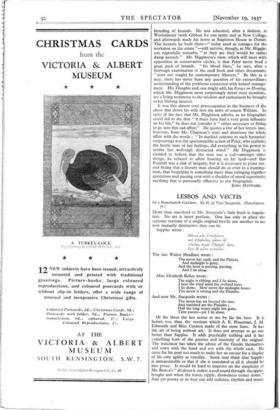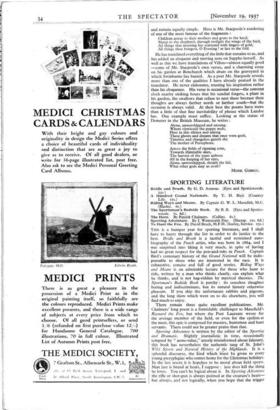LESBOS AND VECTIS
Mon than one-third of Mr. Stacpoole's little book is transla- tion. No art is more perilous. One has only to place the separate versions of a single original beside one another to see now mutually destructive they can be. Sappho wrote :
Siihwe pit, et crtAtirra Kai vklitaSes., plcrat 8; 1,1"ICTES, Trapil 87pxer' Zyia SE itZra Karei.Sio-
The late Walter Headlam wrote : The moon has sunk, and the Pleiads, - And midnight is gone, — - • And the hour is passing, passing, And I lie alone.
Miss Elizabeth Belloc wrote : The night is ebbing, and I lie alone, I hear the wind amid the orchard trees. I lie alone. Slow move the midnight hours. The moon is setting and the Pleiades.
And now Mr. Stacpoole writes : The moon has set beyond the seas, And vanished are the Pleiades ; Half the long weary night has gone, Time passes—yet I lie alone.
Of the three the last seems to me by far the best. It is better, too, than the versions which A. E.-Housman, J. M. Edmonds and Bliss Carmen made of the same lines. It has the art of being without art. It does not attempt to go one better than Sappho. It adds practically nothing and it has something both of the passion and intensity of the original.
The translator has taken the advice of the Greeks themselves and sown with the hand and not with the whole sack. He cares for his poet too much to make her an excuse for a display of his own agility as versifier. Some may think that Sappho is untranslatable or that if she is translated at all it should be into prose. It would be hard to improve on the simplicity of Mr. Bowra's " all about it makes a cool sound through the apple- boughs and when the leaves ripple, drowsiness comes down." And-yet poetry at its best can add cadence, rhythm and music and remain equally simple. Here is Mr. Stacpoole's rendering of one of the most famous of the fragments : Children astray to their mothers and goats to the herd, Sheep to the shepherd, through twilight the wings of the bird, All things that morning has scattered with fingers of gold, All things thou bringest, 0 Evening ! at last to the fold.
He has translated everything of the little that remains to us, and has added an eloquent and moving note on Sappho herself. As well as this we have translations of Villon—almost equally good —some of Mr. Stacpoole's own verses, and a charming essay on his garden at Bonchurch which abuts on the graveyard in which Swinburne lies buried. As a poet Mr. Stacpoole reveals more than one of the qualities I have already praised in the translator. He never elaborates, trusting his inspiration rather than his eloquence. His verse is oceasionaLverse—the convent clock nearby striking hours that his sundial forgets, a plant in his garden, the swallows that refuse to nest there because their thoughts are always farther north or farther south—but the occasion is always valid. At their best the poems have. more than a little of that fine inevitability of phrase which Landor has. One example must suffice. Looking at the statue of Demeter in the British Museum, he writes : Alone, unworshipped and unsung, Where viewlessly the poppy nods, Here in this silence and among These ghosts and dreams that once were gods, Timeless and changeless gazeth she The mother of Persephone.
Across the fields of ripening corn, Towards illimitable skies, The harvest of the years unborn All in the keeping of her eyes, Alone, unworshipped, should she fail, What other gods may us avail? MONK GIBBON.

















































































































 Previous page
Previous page